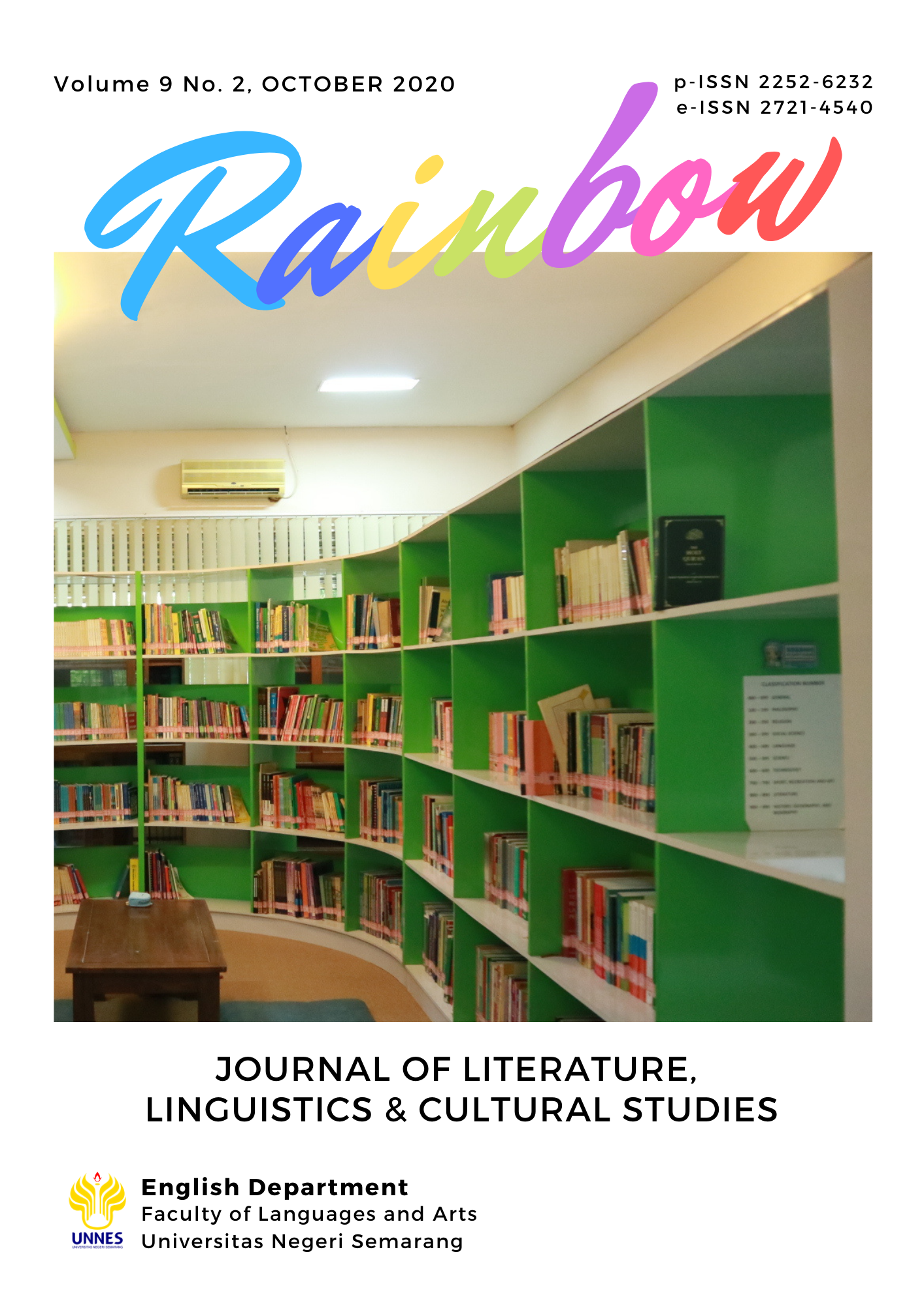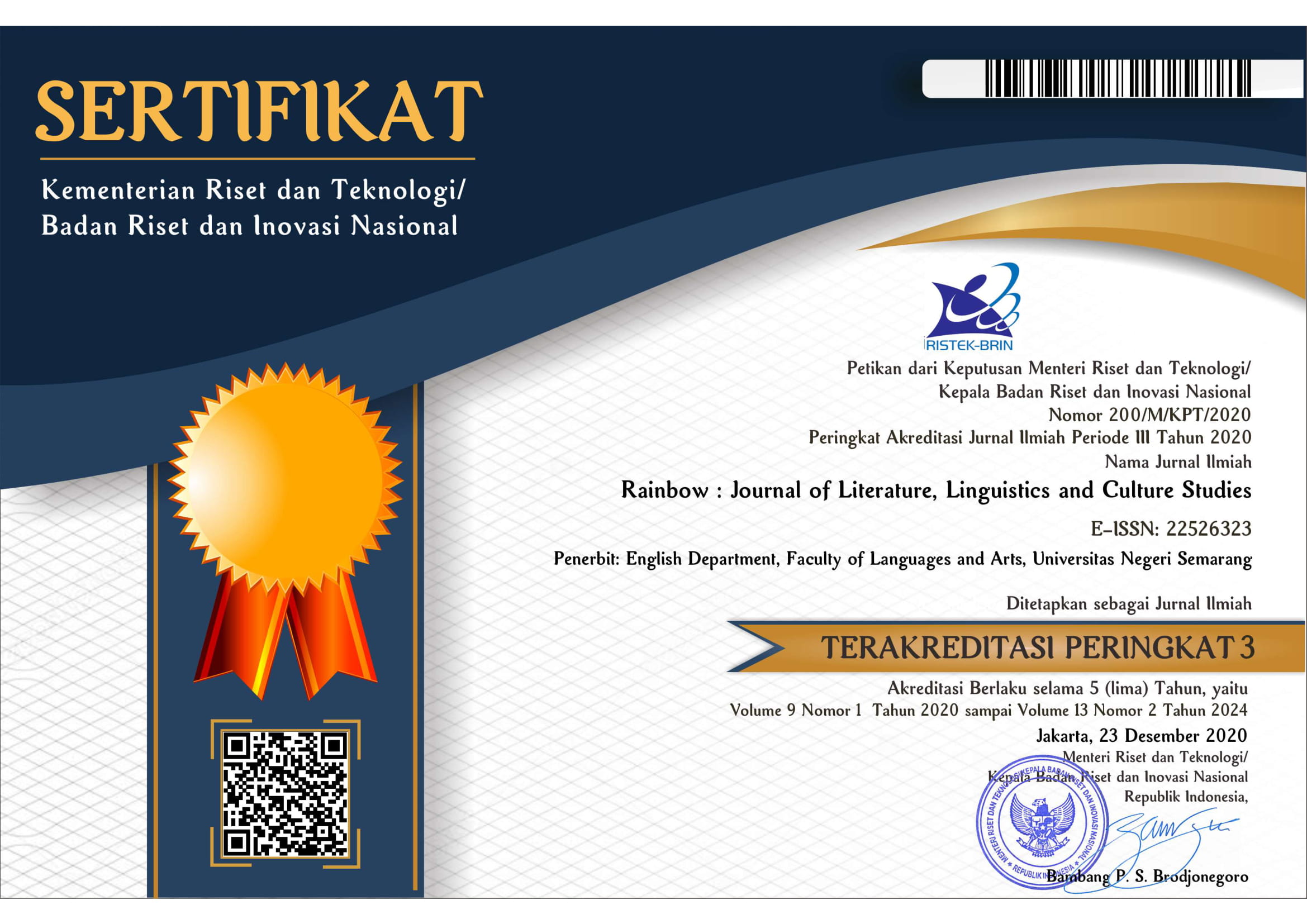Horizon of Expectation of Children’s Ideal Future in 1946 Represented in Enid Blyton’s 'Malory Towers'
Abstract
1946 was a recovery year after Second World War ended and the early modern era. At the beginning of modern era, children were taught the basic attitude of well manners and respecting others. The social attitudes into children give adults more attention to children as separate beings, innocent, and need of protection. Therefore, this study aimed to explain (1) what British expectation toward children’s future described on Enid Blyton’s Malory Towers (2) children’s characters in Enid Blyton’s Malory Towers formed by the participation of British role and (3) today’s perspective of British ideas in 1946. Qualitative descriptive study is employed with “horizon of Expectation†of reader response theory by Hans Robert Jauss is served to analyze the data. It is found that as illustrated in Malory Towers, British were expected their children to be kind, good-hearted, loved, trusted, and reliable child. In addition, parents, school, and friend’s role are important to forming children’s character to teach some values such as discipline, responsible, politeness, caring, loyal and understanding, respectful, mental strength, steady and wise attitude to reach the ideal future. On other hand, in 1946, education aims to change the society to fit the ideas of the ruling government or to create the utopian society through education. Furthermore, there are some similarities and differences of British ideas in 1946 and today’s perspective of British education system and boarding school in which all the ideas have a good aim for children’s future.s
References
Brazil, A. (1914). Blackie & Son. Retrieved september 9, 2019, from Blackie & Son: http://www.ju90.co.uk/his.htm
Bressler, C. E. (1999). LITERARY CRITICISM. New Jersey: Prentice Hall, Inc.
Creswell, J. W. (2009). Research Design Qualitative, Quantitative, and Mixed Methods Approaches Third Edition. California: SAGE Publications, Inc.
Gelpi, A. N. (2019, June 26). Encyclopædia Britannica. Retrieved January 22 , 2020, from Encyclopædia Britannica: https://www.britannica.com/topic/education/Social-reconstructionist-education#ref47655
Gillard, D. (2018, May). Education in England the history of our schools. Retrieved January 22, 2020, from Education in England: http://www.educationengland.org.uk/history/chapter20.ht ml
Harris, A. (2018, February 27). The Irish Times. Retrieved March 29, 2020, from The Irish Times: https://www.irishtimes.com/news/education/the-problem-with-all-girls-schools-1.3399028
Kompasiana. (2020, February 17). Retrieved February 17, 2020, from Kompasiana Beyond Blogging: https://www.kompasiana.com/naurmirojab/54f80aaea33311 aa608b4915/tuntutan-berprestasi-dari-orang-tua-menyebabkan-stres-pada-anak?page =all
Mukerji, S., & Graham, H. F. (2019, June 26). Encyclopædia Britannica. Retrieved January 22, 2020, from Encyclopædia Britannica: https://www.britannica.com/topic/education
Our Kids The Trusted Source. (2019, May 15). Retrieved september 9, 2019, from Our Kids The Trusted Source: https://www.ourkids.net/why-boarding-school.php
The Guardian. (2017, February 27). Retrieved February 2, 2019, from The Guardian: https://www.theguardian.com/society/2017/feb/27/britains-child-migrant-programme -why-130000-children-were-shipped-abroad







